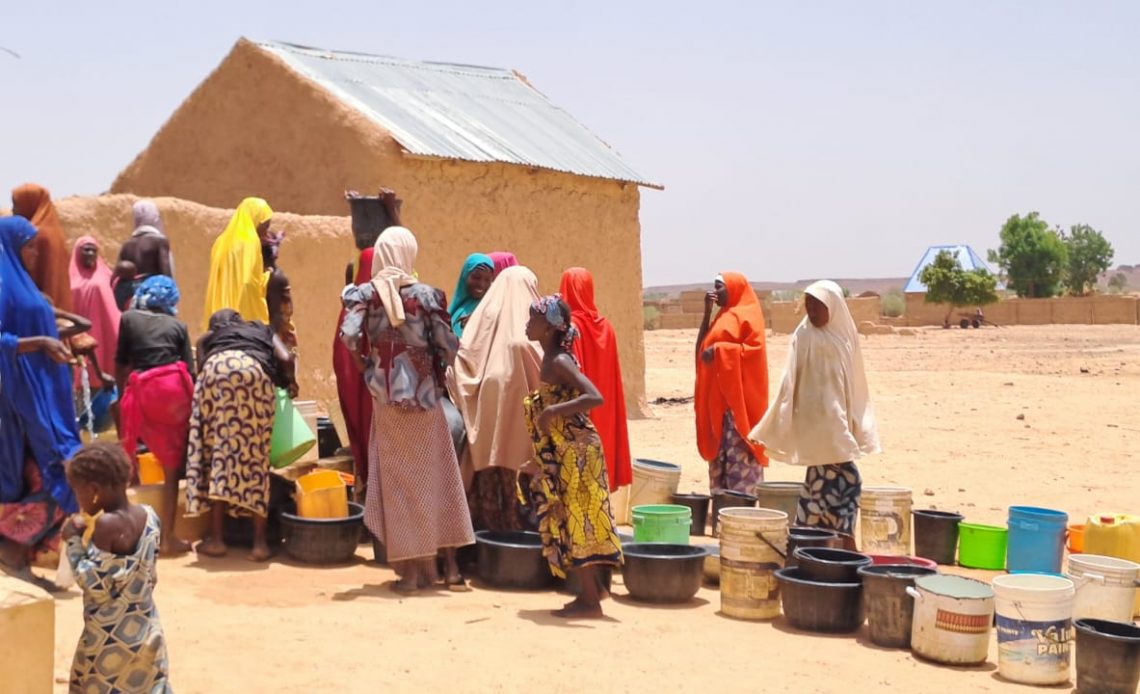By Misbahu El-Hamza and Dabri Ohanu Olohije
Murjanatu Usman is a 35-year-old mother of eight living in Sauwa community in Argungu Local Government Area (LGA) of Kebbi State. She is expecting her ninth child and receives antenatal care (ANC) at the Sauwa Primary Healthcare Centre (PHC).
Murjanatu gave birth to all her children in Sauwa PHC, and she remembers relying on three of her relatives to collect water for the delivery from a nearby well because the the PHC lacked water supply. Furthermore, there was no functional toilet for women, so they walked to a farm near the facility to ease themselves, when pressed. These circumstances prompted many women to choose to give birth at home, with the assistance of traditional birth attendants (TBAs), or travel to Argungu town.
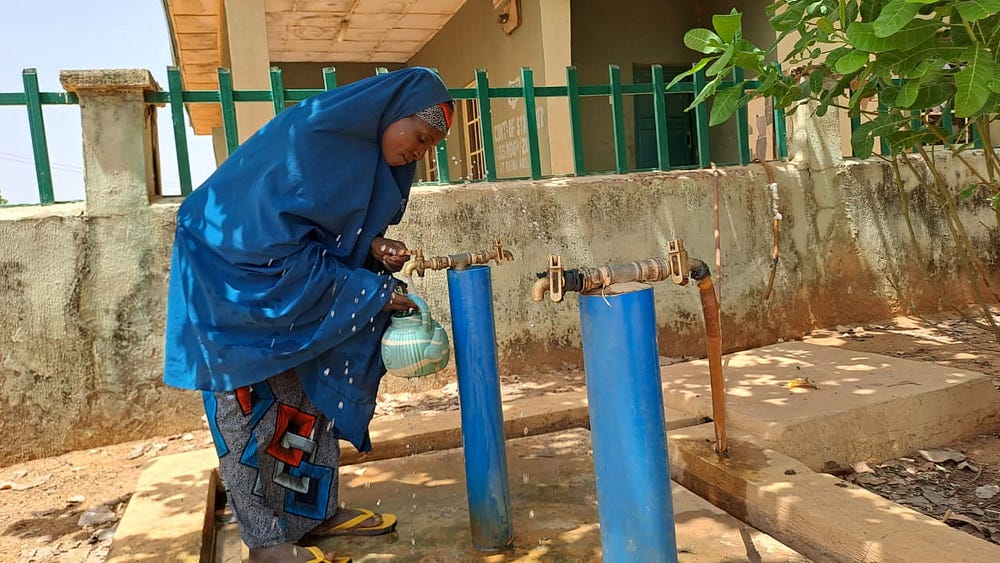
However, in May 2022, the Green Habitat Initiative (GHI), a non-profit organisation dedicated to promoting environmental sustainability in Nigeria, improved service delivery at the PHC when they constructed a solar-powered borehole with a 5000-litre overhead tank, four toilets, a handwashing facility and installed a solar streetlight to illuminate the facility’s surroundings at night.
Fatima Garba, the Assistant Officer-in-Charge (2IC) at Sauwa PHC, said that the facility had recorded a significant increase in the number of women seeking care. She attributed this to the availability of water and toilet facilities, adding that the PHC now sees over 20 pregnant women weekly for ANC and records between 35 to 40 births every month. “More women from Sauwa and even neighbouring communities are increasingly visiting the PHC for antenatal care (ANC) and delivery,” said the 2IC.
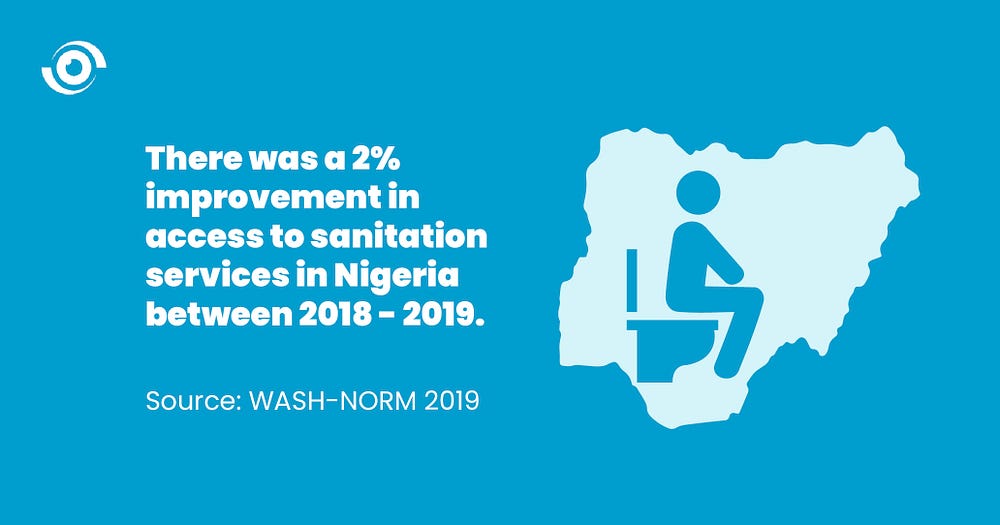
However, Fatima highlighted a challenge they faced due to the high demand for water from their tank. Saying that the tank frequently runs out of water due to the large number of people that come to fetch water from the PHC. “One of the taps is already broken, you can see,” she lamented and expressed hope for the installation of a larger tank and the extension of pipes to serve the local community.
The I-WASH Programme
Sauwa PHC is one of three in Kebbi State’s Argungu, Kalgo, and Gandu Local Government Areas (LGAs) to have received Water, Sanitation, and Hygiene (WASH) facilities as part of the “Improved Sustainability of Integrated WASH Services (I-WASH)” programme. The programme, which started in 2021 is supported and funded by the United States Agency for International Development (USAID) and implemented by the GHI in selected LGAs in Kebbi and Sokoto States, aims to combat waterborne diseases and address associated socio-economic challenges. It adopts a participatory and innovative approach that promotes inclusive access to WASH services in health centres, schools, peri-urban areas, and rural communities in Kebbi and Sokoto States.
The beneficiary LGAs and communities in Kebbi State were not selected at random. According to the 2019 Water, Sanitation, and Hygiene — National Outcome Routine Mapping (WASH-NORM) report, Kebbi State is one of two states in Nigeria with the lowest levels of access to essential water services in Nigeria, with an estimated 39% and 35% access to essential water services and sanitation, respectively.
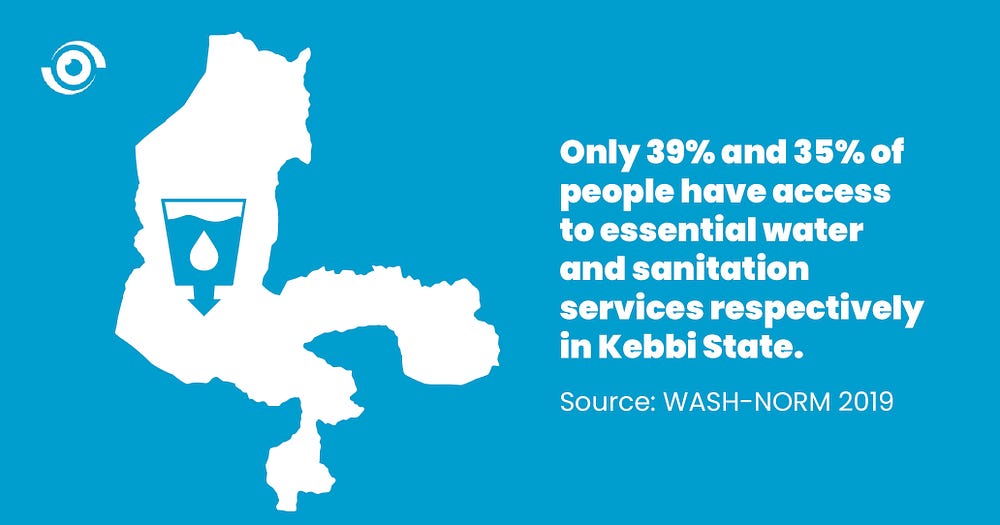
As a result, GHI partnered with the Kebbi State Rural Water Supply and Sanitation Agency (RUWASA) to conduct a baseline study across ten LGAs, taking into account factors such as security, the presence of community-based organisations (CBOs), ward development committees (WDCs), mosques, and church committees. Relevant stakeholders, including the Ministry of Local Government and Chieftaincy Affairs and the Ministry of Budget and Economic Planning, were also involved in the baseline analysis. The most deprived communities in Argungu, Kalgo, and Gandu LGAs were selected for intervention, based on ranking criteria.
Improving WASH services in schools
Sauwa Model Primary School (SMPS), located at the heart of the community, accommodates 1,401 students and employs 7 teaching staff. Previously, the school lacked functional toilets, so the students struggled with the poor amenities to relieve themselves.
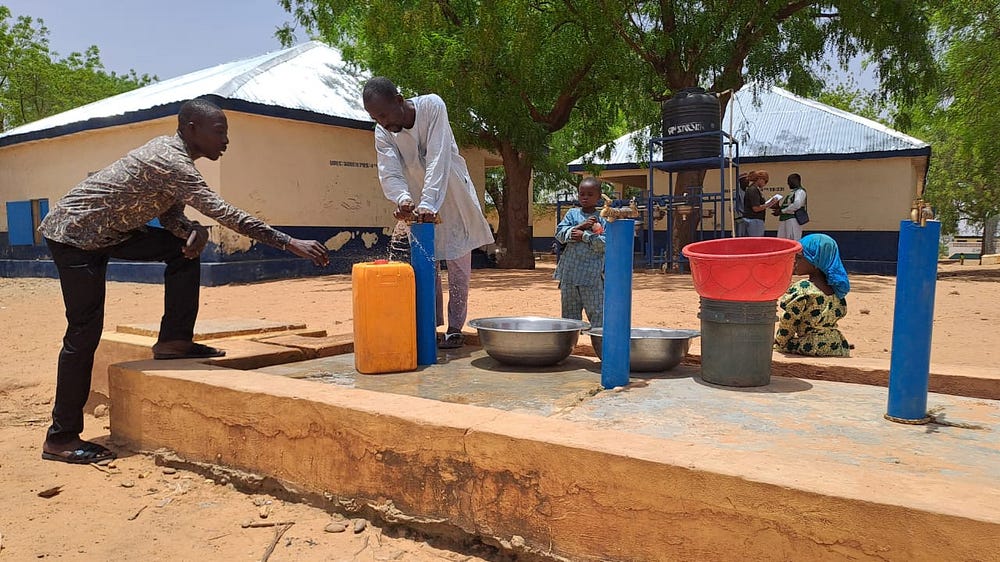
However, the situation changed when the I-WASH programme built four toilets for boys, four for girls, two for people with disabilities, a handwashing facility, and a solar-powered borehole with a 5000-litre overhead tank. To maintain the facilities, the school established an “environmental health club” for pupils, led by the school health master. The club monitors and maintains the taps, toilets, and handwashing facility and reports any damage to the headteacher. Furthermore, the club serves as a learning platform for students to learn about environmental health and sanitation.
According to Lawan, the programme has resulted in significant improvement at SMPS. “Pupils no longer engage in open defecation within school compound, and they don’t suffer the lack of drinking water,” he said, noting that the programme didn’t provide separate toilets for male and female staff members. As a result, staff members were forced to use the student toilets, which, he said, caused considerable discomfort. In addition, the handwashing facility is no longer functional because the flexible waste pipes were broken and have yet to be repaired.
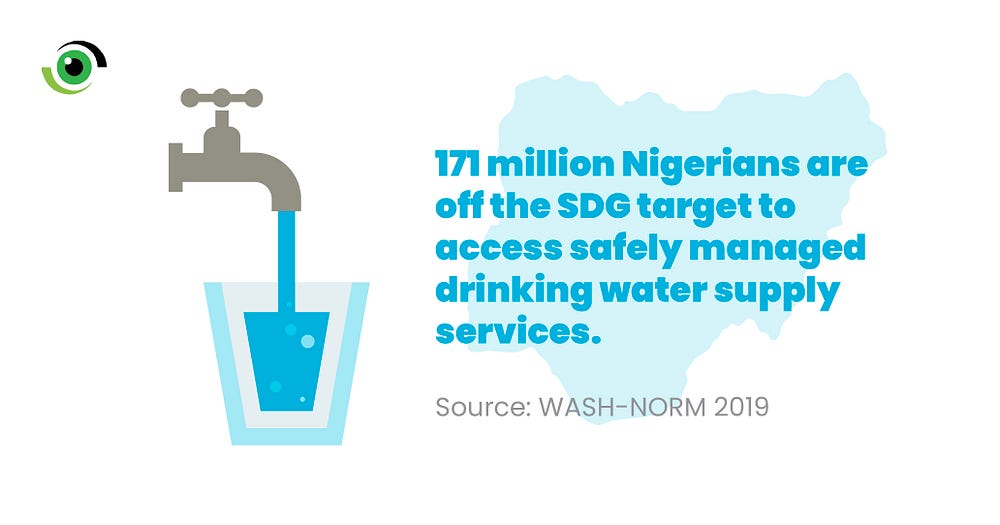
Community empowerment
Prior to the I-WASH intervention in Dalijan community in central Kebbi State’s Gwandu LGA, members of the community relied on water from a single well to meet their WASH needs. According to Zinaru Abubakar, Dalijan’s women’s leader, the well dried up during the dry season, forcing women and girls to travel more than a kilometre to neighbouring communities in search of water. In addition, most homes lacked toilet facilities, resulting in open defecation as well as hygiene and sanitation concerns.
To solve these challenges, GHI built an underground solar-powered borehole to provide the community with a sustainable and reliable water source. They also supported the construction of toilets in households, which helped to reduce the practice of open defecation in the community.
According to Dr Hamza Jakada, Project Manager for the I-WASH programme, as of May 2022, GHI had successfully built 300 functional toilets in 300 households across 36 communities in the three LGAs.
Mun ji fari fes a ranmu, “we were delighted”, said Zinaru, describing how they felt the first day they saw water flowing from the taps. They no longer get up early and walk a long distance to fetch water.
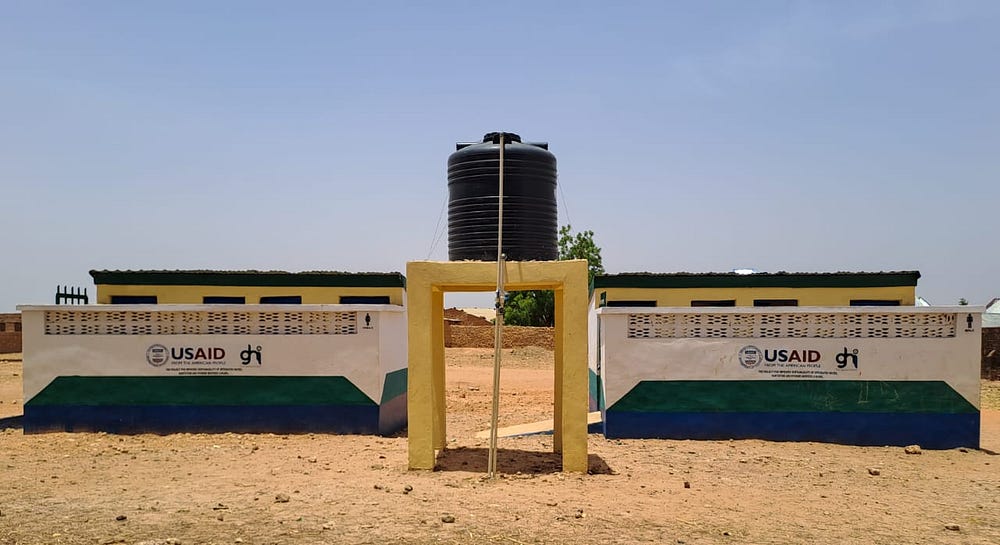
Community involvement to foster ownership
According to Dr Jakada, community members were actively involved in the decision-making process and were encouraged to take ownership of the programme in their respective communities. Community members were also educated on the health implications of open defecation and were given training on how to handle minor issues at the water points. To prevent the practice of open defecation, the community members employed different means including adopting terms that evoked disgust in the practice.
Idrisu Labbo is the assistant chairman of the Dalijan community-based committee called “WASHCOM” which was formed to monitor the water points maintenance. “We collect a monthly contribution of ₦20 from each household. This is to fund repairs in case of any damage. If a community successfully saves for over 12 months without damaging the water facility, additional underground pipes will be installed to distribute water to another point for easier access and reduced congestion,” said Labbo.
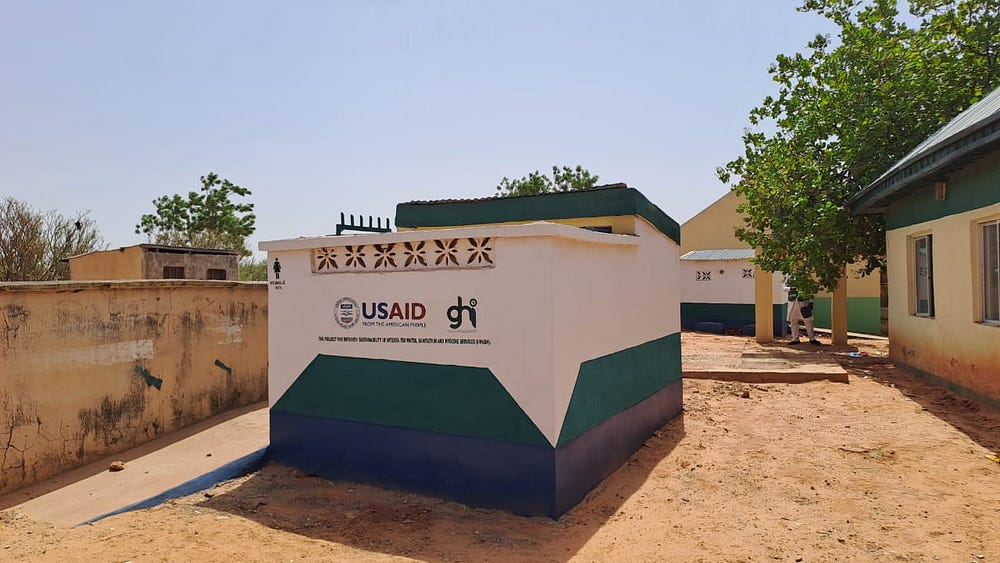
A daunting journey ahead
WASH programmes such as I-WASH in rural communities with limited access to opportunities frequently encounter critical challenges in terms of community buy-in and commitment owing to economic deprivation. For instance, Muhammad Ashabu, the GHI focal person in Kebbi recalled that beneficiary communities in the three LGAs could not afford to build their own toilets in their houses because of financial difficulties. In addition, he stated that, according to their findings, many communities that benefited from prior WASH interventions were unable to sustain it due to a lack of funds for maintenance.
However, economic deprivation should not justify the deaths of 70,000 children under the age of five, due to a lack of access to clean and safe water, sanitation, and hygiene services. Therefore, closing the failure gap and providing lasting and reliable WASH services to communities requires the use of sustainability principles and practices from the very outset of programme development.


